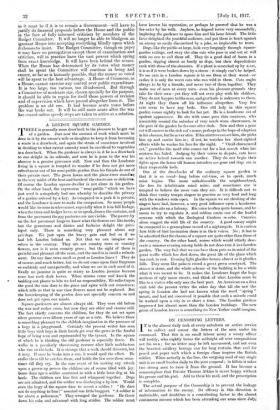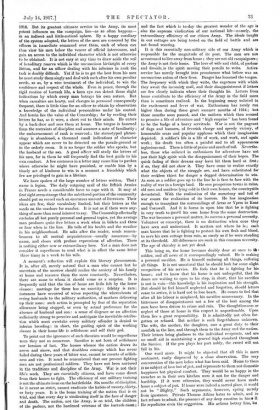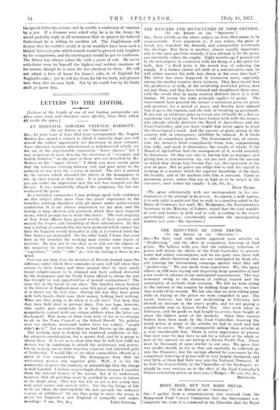ON CENSORING LETTERS.
1T is the almost daily task of every subaltern on active service to collect and censor the letters of the men under his command. That this is no small labour many a weary officer will testify, who nightly burns the midnight oil over compositions not his own ; for no letter may be left uncensored, and not even the heaviest artillery barrage CAR for long restrain that real for pencil and paper with which a foreign clime inspires the British soldier. When actually in the line, the outgoing mail of any single unit is no small burden daily to the post corporal ; in billets it takes two strong men to raise it from the ground. It has become a commonplace that Private Thomas Atkins is never happy without his grouse and his pint. Add to these his mail, and the prescription is complete.
The actual purpose of the Censorship is to prevent the leakage of information to the enemy. Its efficacy in this direction is undeniable, and doubtless is a contributing factor to the almost continuous sucoess which has been attending our arms since July, 1916. But its greatest ultimate service to the Army, its most potent influence on the campaign, lies—as ao often happens— in an indirect and little-noticed sphere. By a happy corollary of the system adopted, the letters of the men are censored by the officers in immediate command over them, each of whom can thus view his men below the veneer of official intercourse, and gain an access to the individual character which is not otherwise to be obtained. It is not easy at any time to draw aside the veil of hereditary reserve which is the unconscious birthright of every Briton, and for an officer dealing with his inferiors in rank the task is doubly difficult. Yet if he is to get the best from his men he must study them singly and deal with each after his own peculiar needs, so as, by a wise treatment of the individual, to win the confidence and respect of the whole. Even in peace, through the rigid routine of barrack life, a keen eye can detect those slight indications by which every man betrays his own nature. But when casualties are heavy, and changes in personnel consequently frequent, there is little time for an officer to obtain by observation a knowledge of the individual personalities under his control. And herein lies the value of the Censorship ; for by reading their letters he has, as it were, a short cut to their minds. He enters by a back-door and secs them at home. The tongue is loosened from the restraints of discipline and assumes a note of familiarity ; the embarrassment of rank is removed ; the stereotyped phrase- ology is abandoned, a thousand small indications of character appear which are never to be detected on the parade-ground or in the orderly room. It is no longer the soldier who speaks, but the husband or the son. A good officer will study the letters of his men, for in them he will frequently find the best guide to his own conduct. A few sentences in a letter may cause him to pardon where otherwise he might have punished, or enable him by a timely act of kindness to win in a moment a friendship which few are privileged to gain in a lifetime.
We have spoken of the large number of letters written. Their name is legion. The daily outgoing mail of the British Armies in France needs a considerable force to cope with it. It may at first sight seem strange that the unlettered portion of the community should put on record such an enormous amount of literature. Their ideas. are few, their vocabulary limited, but their letters as the sands on the seashore for number. It is not as if there were any- thing of more than usual interest to say. The Censorship effectually excludes all but purely personal and general topics, yet the average man produces quite five letters a week when in billets and three or four when in the line. He tells of his health and the weather in his neighbourhood. He asks after the reader, sends remem- brances to all mutual acquaintances—usually numerous—by name, and closes with profuse expressions of affection. There is nothing either new or extraordinary here. Yet a man does not consider it superfluous to send what is in effect the same letter three times in a week to his wife.
A moment's reflection will explain this literary phenomenon. It is, after all, merely natural that a man who cannot but be uncertain of the morrow should realize the anxiety of his family at home and reassure them the more constantly. Nevertheless, there are some to whom it should come as a surprise. It is frequently said that the ties of home are little felt by the lower classes : marriage for them has no sanctity : fidelity is ram: instances have occurred of wives reporting the whereabouts of erring husbands to the military authorities, of mothers delivering up their sons : such action is prompted by fear of the separation allowance being stopped, or even by actual preference for the absence of husband and son : a sense of disgrace or an affection sufficiently strong to perceive and anticipate the inevitable retribu- tion which must overtake every military offender is denied to inferior breeding : in short, the guiding spirit of the working classes in their home life is selfishness and self their god.
To point out the ignorance of such theorists would be superfluous were they not so numerous. Sacrifice is not born of selfishness nor heroism of lust. The homes whence the nation draws its nerve and sinew, and that deathless courage which has never failed during three years of bitter war, cannot be resorts of selfish- ness and vice. It must be remembered that our present fighting men are not professional soldiers. They have not been nurtured in the traditions and discipline of the Army. War is not their life's work. They are essentially citizens, and have come direct from their homes to fight. The efficiency of our military training is not the ultimate issue on the battlefield& Six months of discipline, be it never so strict, cannot eradicate the habits of twenty, thirty, or forty years. It is the home training of the nation that is on trial, and that every day is vindicating itself in the face of danger and death. The nation, not the Army, is on trial, the children of the parlour, not the hardened veterans of the barrack-room ; and the fact which is to-day the greatest wonder of the age is also the supreme vindication of our national life—namely, the extraordinary efficiency of our citizen Army. The ideals taught in our cottages are being tested on the field of battle and Me not found wanting.
It is this essentially non-military side of our Army which is responsible for the magnitude of its post. The men are not accustomed to live away from home ; they are not old campaigners ; the Army is not their home. The love of wife and child, of parlour and fireside, is the spirit moving their pencils to write. Active service has merely brought into prominence what before was an unconscious axiom of their lives. Danger has loosened the tongue. The frequency with which they write, the eagerness with whisk they await the incoming mail, and their disappointment if letters are few clearly indicate where their thoughts lie. Letters from home contribute to the efficiency of the Army in the field more than is sometimes realized. In the beginning many enlisted in the excitement and fever of war. Enthusiasm has rarely run higher than during those great summer months of 1914 ; but those months soon passed, and the uniform which then seemed to promise a life of adventure and " high emprise " has been found to be the badge of a heavy servitude. War is not the pageant of flags and banners, of. feverish charge and speedy victory, of honourable scam and popular applause which their imagination depicted. A soldier's life is a life of work, and work, and again work ; his death too often a painful and to all appearancees inglorious end. There is little of praise and much of toil. Neverthe- less, those who enlisted in enthusiasm for adventure have not lost their high spirit with the disappointment of their hopes. The quick fading of their dreams may have hit them hard at fast; if so, they did not show it. They have come to realize exactly what the objects of the struggle are, and have substituted for their reckless thirst for danger a dogged determination to win. As soon as a soldier goes up to the line he is face to face with the reality of war in a foreign land. He sees prosperous towns in ruins, old men and maidens lying cold in their own homes, the countryside devastated. With the realization of the monotony and toil of war comes the realization of its horrors. He has imagination enough to transplant the surroundings of Arras or Ypres to Kent and Cornwall. And it is borne in upon him that he is fighting in very truth to guard his own home from the same destruction. The war becomes a personal matter, its success a personal necessity. Volunteer or conscript, there is no distinction when once they have seen and understood. It matters not where he is ; each man knows that he is fighting to protect his own flesh and blood, to save his own cottage from ruin, as surely as if he were standing at its threshold. All differences are sunk in this common necessity. The age of chivalry is not yet dead.
This being so, the home becomes doubly dear at once to the soldier, and all news of it correspondingly valued. He is making a personal sacrifice. He is himself enduring all things, suffering all things. It is not unnatural that he should look for some slight recognition of his service. He feels that he is fighting for his home ; and to know that his home is not unforgetful, that its doors are waiting to open to his step, in short, that his sacrifice is not in vain—this knowledge is his inspiration and his strength. But should he feel himself neglected and forgotten, should letters cease to arrive, it is hard not to lose heart. He comes to feel that after all his labour is misplaced, his sacrifice unnecessary. In the bitterness of disappointment not a few of the best among the men have been driven to crime and ruin. The thoughtlessness or neglect of those at home in this respect is unpardonable. Upon them lies a great responsibility. It is admittedly not often for- gotten or refused. But neither is such forgetfulness unknown. The wife, the mother, the daughter, owe a great duty to their menfolk in the line, and through them to the Army and the nation. Their letters bring gladness to the individual recipients, and are no small aid in maintaining a general high standard throughout the Service. If the pen plays her part nobly, the sword will not fail in his.
One word more. It might be objected that all this is mere sentiment, easily disproved by a close observation. The very conversation of the men belies what has been said. Home to them is no subject of love but of jest, and represents to them not domestic: happiness but physical comfort. They would be as happy in the trenches as in their own kitchen were it not for the danger and hardship. If it were otherwise, they would never have made home a subject of jest. If home were indeed a sacred place, it would not be " Blighty." Such arguments, however, spring merely from ignorance. Private Thomas Atkins hates to admit, and in fact refuses to admit, the presence of any deep emotion in him@ If. He repudiates even the suggestion. His actions betray him, bu his speech belies his actions, and he avoids a confession of emotion by a jest. If a German were asked why he is in the Army, he would probably reply in all seriousness that to protect his beloved Fatherland he is willing to sacrifice all. The Englishman will declare that he couldn't avoid it or ho wouldn't have been such a blinkin' fool as to join, which remark would be greeted with laughter by his companions, and his interrogator would be put to confusion. The Briton has always taken life with a grain of salt. He never articulates even to himself the highest and noblest emotions of his nature, though he is none the less obedient to them. He will not admit a, love of home for home's sake, or of England for England's sake ; yet he will lay down his life for both, and greater love than this no man bath. Not by his words but by his fruits shall ye know him.




























 Previous page
Previous page